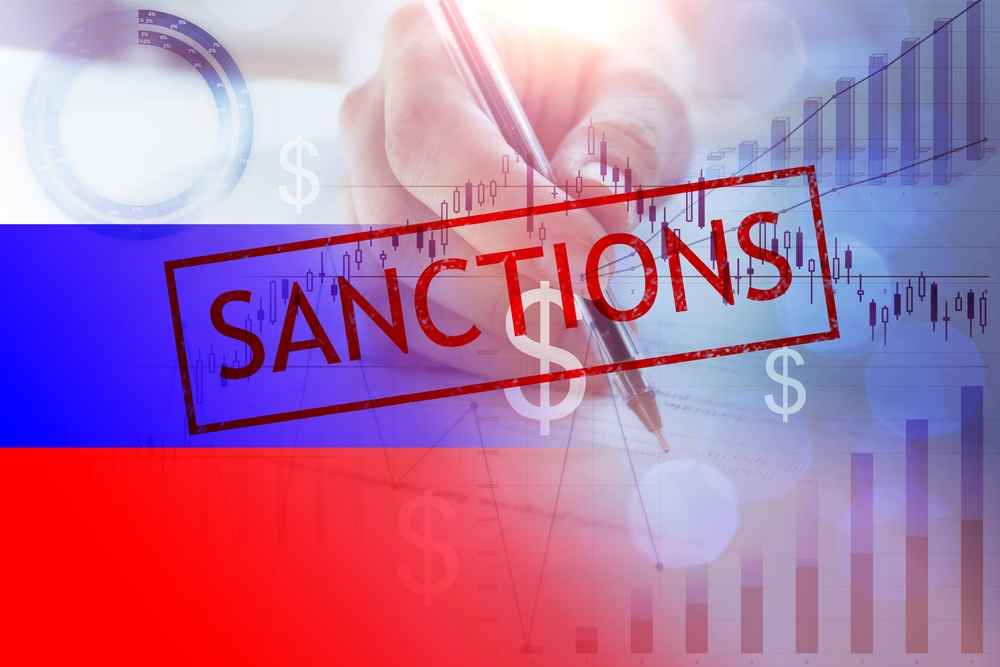We look at whether sanctions can be effective as a geo-political tool to mitigate tensions
The ongoing Russia-Ukraine Conflict is like the sword of Damocles that threatens global peace and security. After two world wars, the scars of nuclear warfare from World War 2 are still seared into memory. Thus, the very notion of a nuclear war occurring has served as an effective deterrent.
Instead of engaging in the war directly, nations have instead turned to financial measures to circumvent military conflict. Presently, the US and European Union have imposed heavy sanctions on Russia owing to its invasion of Ukraine. These sanctions are the most trenchant on a major world power since World War 2. However, being that Russia is a critical commodities exporter, what are the implications of these sanctions on the world economy? Based on insights from Bloomberg, let’s take a closer look.
The current state of sanctions
We can conveniently switch to another channel to avoid watching the horrors of the Russia-Ukraine war. However, the fact remains that the world is facing the consequences of the ongoing Russia-Ukraine conflict.
Presently, as the debris has barely settled in Ukrainian cities in the aftermath of shelling by Russian forces, it is difficult to express the wanton loss of human life. The once thriving cities in Ukraine have turned into ghost towns almost overnight. The nature of this drastic change in Ukraine is difficult to put into mere words.
In this context, it would be easy to assume that the current sanctions on Russia have not stopped the war and are therefore a failure. These sanctions include the imposition of trade embargos with Western nations, A SWIFT expulsion (SWIFT is critical for international trade), and even the freezing of Russia’s foreign reserves.
The truth is that determining the impact of sanctions—or any policy, for that matter—on the desired outcome is a difficult endeavour for even the most accomplished observers. The lack of a parallel is the most difficult aspect of addressing such a question. In case of Russia, such a parallel would be: What would have occurred in Ukraine if the invading country had not been sanctioned? The fact that Russia is still fighting in Ukraine does not negate the effectiveness of the sanctions.

Are sanctions effective?
Sanctions are usually applied to indicate disapproval and assuage domestic constituencies. Such is the case with the current Russia-Ukraine conflict. According to Drexel researchers who assessed the effectiveness of sanctions, around 35% of the declared goals for imposing sanctions were completely met, 14% were partially met, 6% ended in a negotiated settlement, 22% failed, and the balance had yet to be determined. However, success varied based on the sanction’s specific goal, with the aim of supporting democracy and human rights and countering terrorism being the most successfully achieved.
Sanctions imposed between countries that are typically friendly operate better than sanctions imposed between countries with a history of hostilities. Fearing a superpower confrontation, the US imposed sanctions in the 1950s to persuade Israel and the United Kingdom to abandon a drive to reclaim the Suez Canal from Soviet-backed Egypt, which had nationalised it. Isolated authoritarian regimes, such as those in North Korea and Syria, are less likely to respond to sanctions than democratic or quasi-democratic nations that care about world opinion and rely on global commerce and finance.
Multiple nations imposing devastating sanctions on a specific region or nation are the most effective. For instance, South Africa’s discriminatory apartheid policy was partially dismantled thanks to a global boycott in the 1980s. Iran’s economy was pressured by international sanctions, prompting its leaders to return to discussions that resulted in an accord that curtailed the country’s nuclear programme until it was undercut by the US in 2018.
A double edged sword?
Sanctions, as seen recently during the Russia-Ukraine crisis, can have collateral damage in the form of rising inflation and a shortage of essentials. This collateral damage is not just happening in Russia but also across most of the world as crude oil prices have risen significantly. Which is why, governments have shifted their focus to “targeted sanctions,” which focuses on a specific mark or combination of marks rather than a whole country or sector. Sanctions on Russia, the world’s second-largest petroleum exporter and an important supply of fertiliser, wheat, and metals such as nickel, platinum, and aluminium, is also expected to have serious effects for penalising countries. The tightening of sanctioView Postns on Russia produced a jump in oil and food prices, which generated a protracted inflation shock that threatened to halt global economic development.
Sanctions can act as a blunt diplomatic tool or a precision smart weapon based on how they are imposed and which countries are imposing them; In that sense sanctions, are a better alternative to a full-fledged global conflict that leads to the immeasurable loss of life and large-scale devastation. Despite the global geopolitical fallout, time will tell if the sanctions imposed upon Russia will prove to be effective and eventually lead to an end to the conflict.
Broadly speaking, sanctions must be gauged for its humanitarian impact, and its consequences on civilians and human rights. Let’s take for instance South Sudan or the West African States, the sanctions there have probably polarized the situation and pushed back the socio-economy of the region. Most importantly, the legitimacy of sanctions as a tool should be a critical area of focus; it should not become an instrument that is misused.



